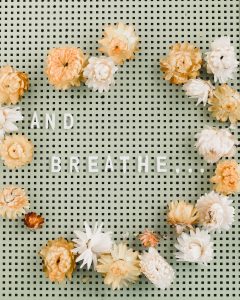Holiday Wisdom: How to Have the Best Holiday Ever
 It is practically cliché by now, but nonetheless true: the meaning of the holidays often gets lost in the glitter and bows, bawdy holiday parties and last-minute rushes to satisfy obligatory gift lists – each year’s craftily marketed Madison Avenue “must-haves.” This flurry of activity leaves the American public bleary-eyed and suffering, though we can’t imagine why, from the infamous holiday blues. It’s supposed to be the greatest time of the year, but instead it ends up one big blur, often obscured by anxiety, depression or family discord.
It is practically cliché by now, but nonetheless true: the meaning of the holidays often gets lost in the glitter and bows, bawdy holiday parties and last-minute rushes to satisfy obligatory gift lists – each year’s craftily marketed Madison Avenue “must-haves.” This flurry of activity leaves the American public bleary-eyed and suffering, though we can’t imagine why, from the infamous holiday blues. It’s supposed to be the greatest time of the year, but instead it ends up one big blur, often obscured by anxiety, depression or family discord.
Why does this happen year after year? And how can we recapture the magic of the holidays and celebrate rather than complain? In the name of Aristotle, who said “happiness is the meaning and the purpose of life, the whole aim and end of human existence,” how can we best guarantee that our holidays are, indeed, happy ones?
The constancy of marketplace bombardment on our poor, defenseless senses – sight, smell, taste, touch, and hearing (which ultimately control our thoughts) – is unrelenting. Our minds are held captive by diverse media, including film, TV, radio, commercials, print advertisements in glossies, news magazines, newspapers and highway billboards, as well as by ads intricately woven into the ever-expanding World Wide Web. All of these material temptations keep us craving what we don’t already possess. Through both explicit and subliminal messages, we are rendered robotic purchasing machines without even knowing it. Short of retreating to a cave, most of us find ourselves blind, deaf, and dumb to our inner worlds, emotionally paralyzed and unable to fully celebrate what should be the most valuable and enriching aspects of our lives.
The cold days of winter could grow warm in the light of deeply felt appreciation, rather than the whole of the holiday season reduced to a countdown calendar of shopping days left ‘til… Viewing the holidays as a time to honor loved ones, friends, coworkers and those who we meet in the course of a day, as well as ourselves, is a worthwhile alternative to the compulsive and seductive consumerism that unwittingly sweeps us away.
In his essay, “Materialism and Its Alternatives,” Tim Kasser says media messages that stress “a meaningful, happy life results from the acquisition of wealth and the possessions that convey the right image and high status,” are unavoidable.
Popular Harvard University professor and happiness guru Tal Ben-Shahar warns that we are looking for happiness in all the wrong places. In his new book, Happier: Learn the Secrets to Daily Joy and Lasting Fulfillment, he describes ways to get the most out of life. “Rather than feeling despondent because we have not yet reached the point ofperfect happiness, rather than squandering our energies trying to gauge how happy we are,” Ben-Shahar says, “we need to recognize that happiness is an unlimited resource and then focus on ways in which we can attain more of it.”
One way to attain more of it is by becoming aware of all the joy inherent in the present moment. Being present is like opening a door that’s been there all along, and finding behind it a new and extremely colorful world. If the holidays make us feel empty and blue, we have the opportunity to look at things through this other door. What we see through it is that, even with all the bumps and perfection-lessness (reconfirmed over and over again by comparison to unattainable, blown-dry, touched-up and embellished media images), our lives are, in the end, pretty amazing just the way they are. A growing awareness dawns on us that our ordinary lives are quite extraordinary.
The challenge of being in the here-and-now (and it is challenging) is made easier by developing a simple mindfulness practice. Without staying focused on “the moment,” we get caught up in ruminative thoughts of the past (cycling memories) or anxiously anticipate the future (projecting ideas of catastrophe or grandiosity). Absent the weight and rapidity of these unnecessary and destructive thoughts, we feel lighter, happier, freer to celebrate that this is a wonderful life.
This new perspective allows us to better connect wholeheartedly with ourselves. We feel more at ease and grateful for the lives we are living.
All of a sudden, we discover we have something to celebrate after all. The holiday season can become an acknowledgement of our greatest gift – life itself – meaningfully celebrated.
The following four simple slogans could serve to rekindle the fire of this year’s holiday season. Each may be repeated silently several times a day, as a reminder:
MINDFULNESS PRACTICES
1. Slow down. Sit in a quiet place and bring awareness to the breath as it naturally comes in and goes out. Do this for several repetitions.
2. Notice the present moment. Fully experience the nature of your environment through the five senses. Notice thoughts in your mind as they come and go, without judgment or attachment. See that thoughts are transitory and have no real hold over the present moment.
3. Realize the moment’s sacredness. Know that this moment has never been before and will never be again.
4. Feel gratitude. Once you are mindful, you will be able to enjoy more fully the moments that mark your life. Slow down. Notice the present moment. Realize the moment’s sacredness. Feel gratitude.
As one year ends and another begins, there is a moment. Moment is followed by moment, each one a sacred instant in time. Appreciation swells, realizing these are the precious moments of life. Gratefulness. Celebration. Swept up in the spirit. Happy holidays!
This first appeared in Ambassador Magazine, Detroit, Michigan
Tags: Dr. Donna Rockwell, gratitude, holidays, mindfulness








Leave a Reply